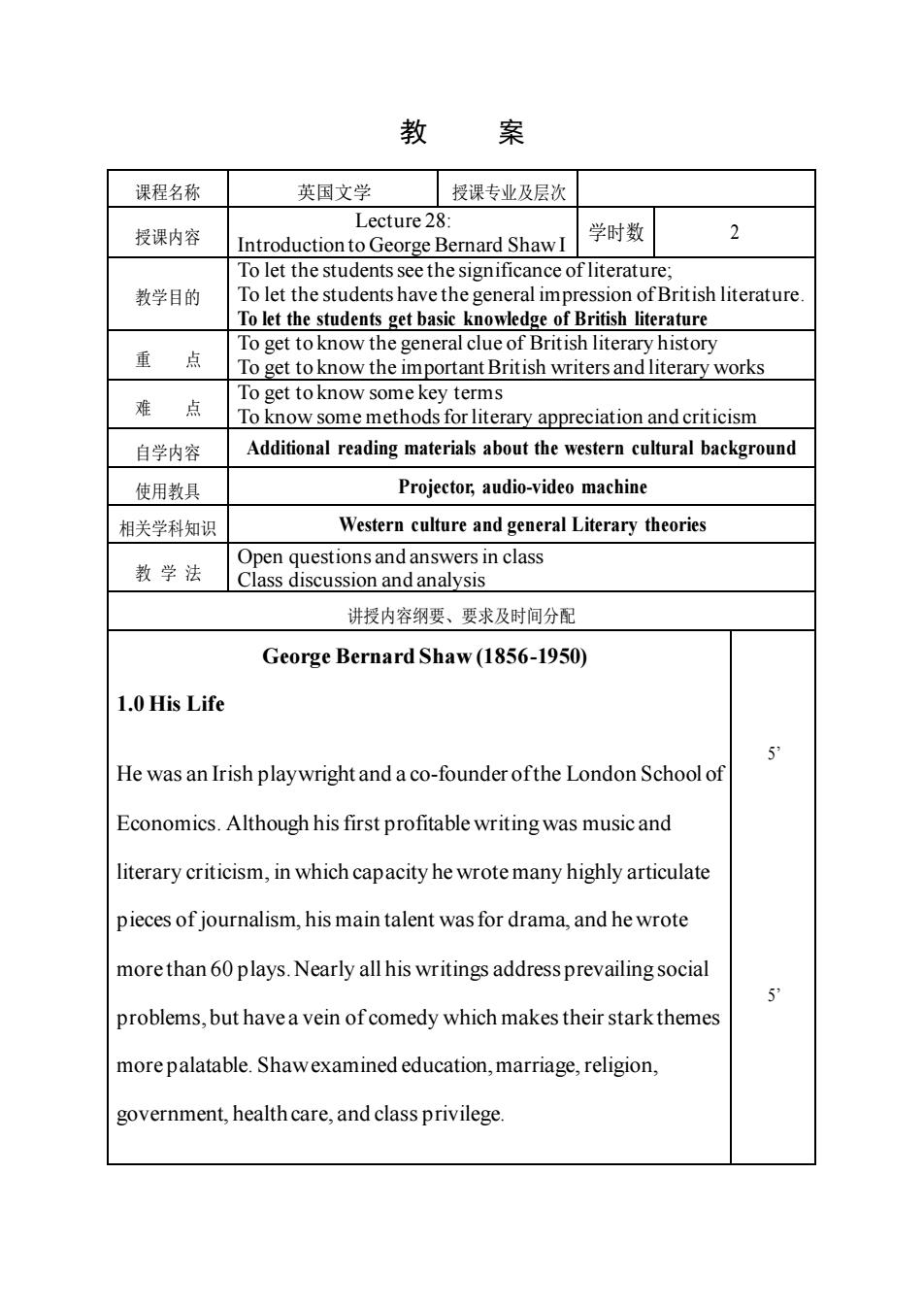
教 案 课程名称 英因文学 授课专业及层次 授课内容 Lecture 28: Introduction to George Bernard Shaw I 学时数 2 To let the students see the significance of literature; 教学目的 To let the students ha avethe sion of British literature To let the students get basic knowledge of British literature 重点 To get to know the general clue of British literary history To get to know the important British writers and literary works 难点 To get to know some key terms 自学内容 Additional reading materials about the western cultural background 使用教具 Projector,audio-video machine 相关学科知识 Western culture and general Literary theories Open questions and answers in class 教学法Class discussion and analysis 讲授内容纲要、要求及时间分配 George Bernard Shaw(1856-1950) 1.0 His Life He was an Irish playwright and a co-founder ofthe London School of Economics.Although his first profitable writing was music and literary criticism,in which capacity he wrote many highly articulate pieces of journalism,his main talent was for drama,and he wrote more than 60 plays.Nearly all his writings address prevailing social 5 problems,but havea vein of comedy which makes their starkthemes more palatable.Shawexamined education,marriage,religion, government,health care,and class privilege
教 案 课程名称 英国文学 授课专业及层次 授课内容 Lecture 28: Introduction to George Bernard Shaw I 学时数 2 教学目的 To let the students see the significance of literature; To let the students have the general impression of British literature. To let the students get basic knowledge of British literature 重 点 To get to know the general clue of British literary history To get to know the important British writers and literary works 难 点 To get to know some key terms To know some methods for literary appreciation and criticism 自学内容 Additional reading materials about the western cultural background 使用教具 Projector, audio-video machine 相关学科知识 Western culture and general Literary theories 教 学 法 Open questions and answers in class Class discussion and analysis 讲授内容纲要、要求及时间分配 George Bernard Shaw (1856-1950) 1.0 His Life He was an Irish playwright and a co-founder of the London School of Economics. Although his first profitable writing was music and literary criticism, in which capacity he wrote many highly articulate pieces of journalism, his main talent was for drama, and he wrote more than 60 plays. Nearly all his writings address prevailing social problems, but have a vein of comedy which makes their stark themes more palatable. Shaw examined education, marriage, religion, government, health care, and class privilege. 5’ 5’
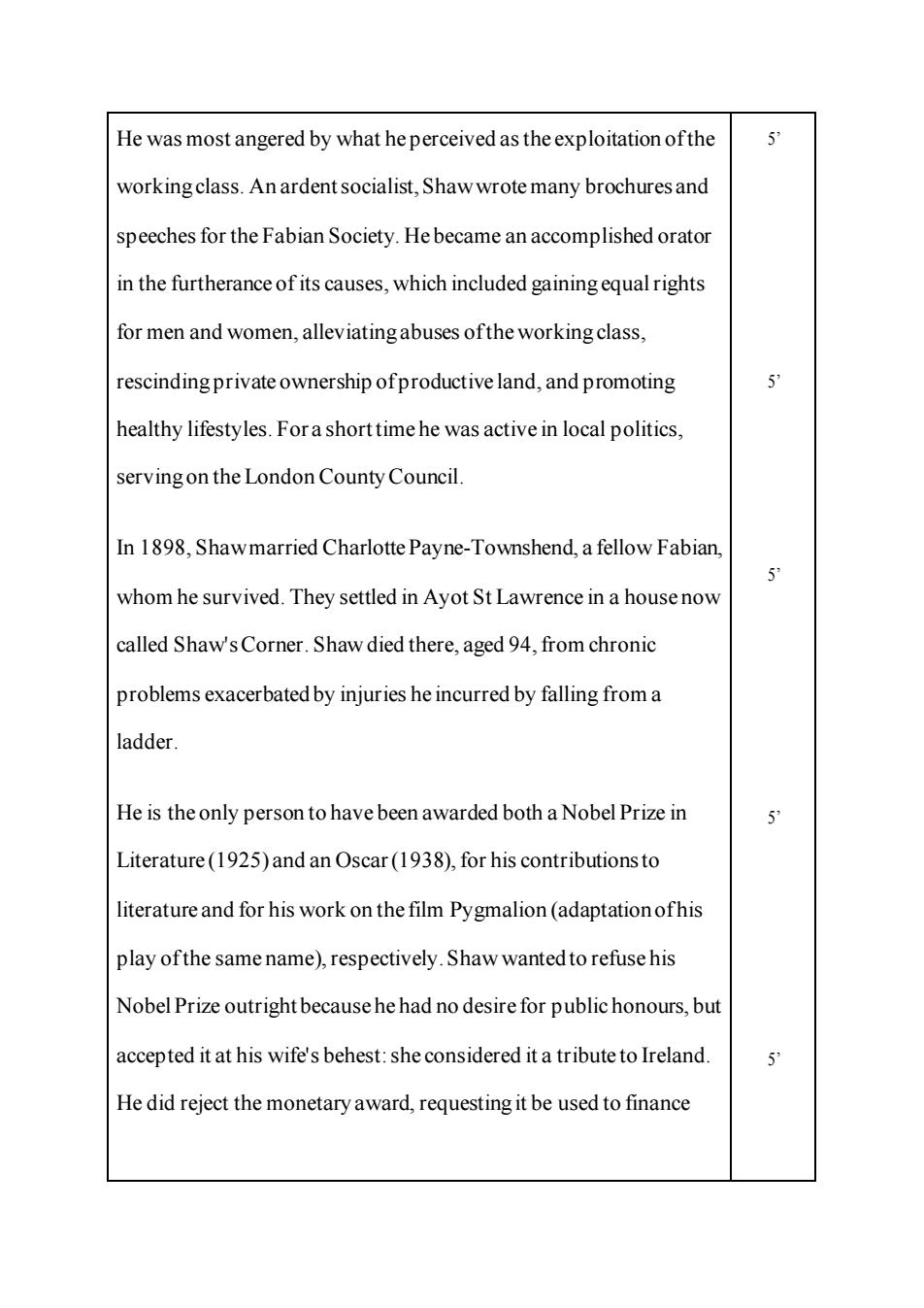
He was most angered by what he perceived as the exploitation ofthe 5 workingclass.An ardent socialist,Shaw wrote many brochures and speeches for the Fabian Society.He became an accomplished orator n the furtherance of its causes,which included gainingequal rights for men and women,alleviating abuses ofthe working class, rescinding private ownership ofproductive land,and promoting 5 healthy lifestyles.Fora shorttime he was active in local politics. serving on the London County Council. In 1898,Shawmarried Charlotte Payne-Townshend,a fellow Fabian. 5 whom he survived.They settled in Ayot St Lawrence in a house now called Shaw's Corner.Shaw died there,aged 94,from chronic problems exacerbated by injuries he incurred by falling from a ladder. He is the only person to have been awarded both a Nobel Prize in Literature(1925)and an Oscar(1938),for his contributions to literature and for his work on the film Pygmalion (adaptation ofhis play ofthe same name),respectively.Shaw wanted to refuse his Nobel Prize outright because he had no desire for public honours,but accepted it at his wife's behest:she considered it a tribute to Ireland. 5 He did reject the monetary award,requesting it be used to finance
He was most angered by what he perceived as the exploitation of the working class. An ardent socialist, Shaw wrote many brochures and speeches for the Fabian Society. He became an accomplished orator in the furtherance of its causes, which included gaining equal rights for men and women, alleviating abuses of the working class, rescinding private ownership of productive land, and promoting healthy lifestyles. For a short time he was active in local politics, serving on the London County Council. In 1898, Shaw married Charlotte Payne-Townshend, a fellow Fabian, whom he survived. They settled in Ayot St Lawrence in a house now called Shaw's Corner. Shaw died there, aged 94, from chronic problems exacerbated by injuries he incurred by falling from a ladder. He is the only person to have been awarded both a Nobel Prize in Literature (1925) and an Oscar(1938), for his contributions to literature and for his work on the film Pygmalion (adaptation of his play of the same name), respectively. Shaw wanted to refuse his Nobel Prize outright because he had no desire for public honours, but accepted it at his wife's behest: she considered it a tribute to Ireland. He did reject the monetary award, requesting it be used to finance 5’ 5’ 5’ 5’ 5’
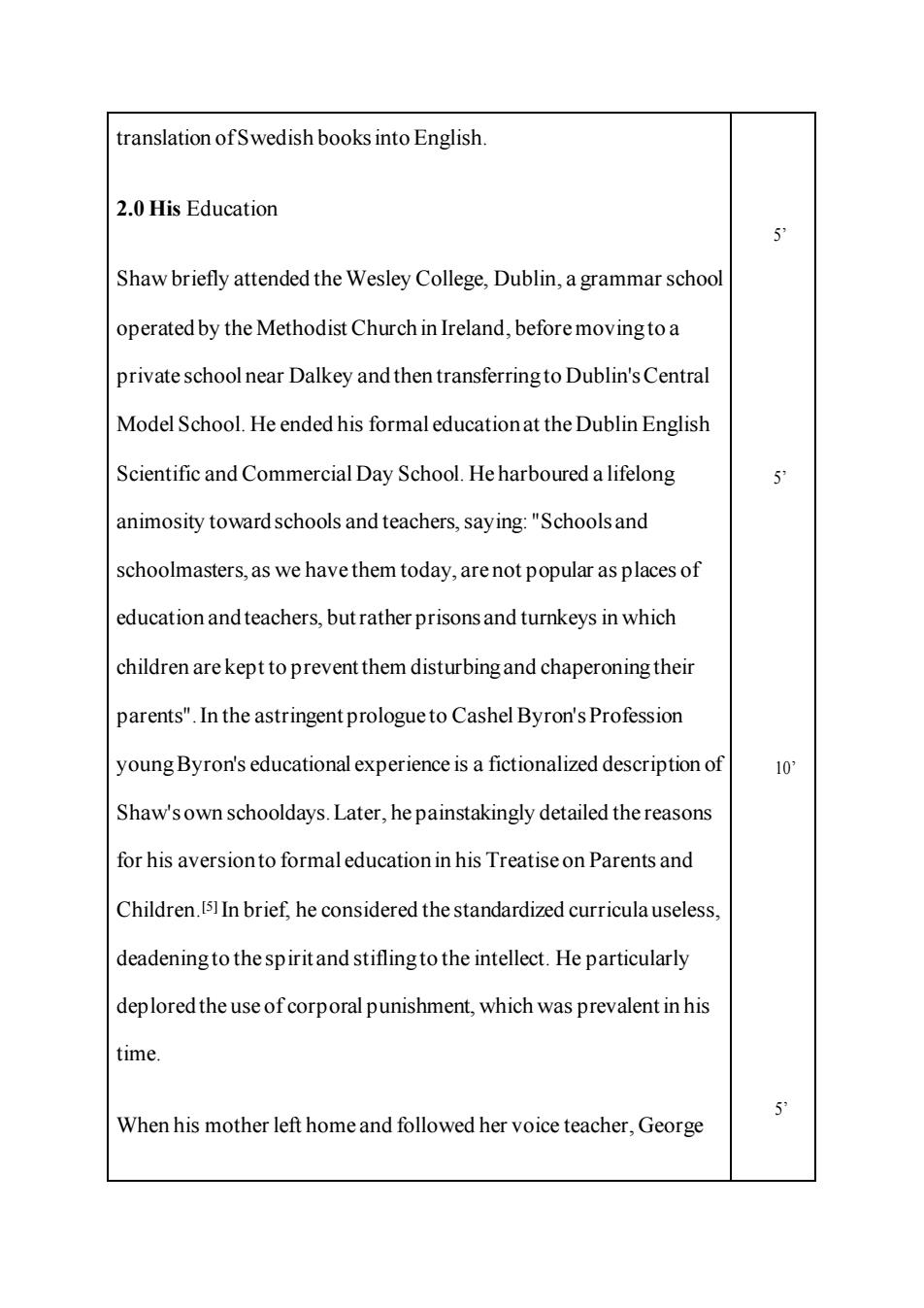
translation ofSwedish books into English 2.0 His Education Shaw briefly attended the Wesley College.Dublin,a grammar school operated by the Methodist Church in Ireland,before movingto a private school near Dalkey and then transferring to Dublin's Central Model School.He ended his formal educationat the Dublin English Scientifie and Commercial Day School.He harboured a lifelong animosity toward schools and teachers,saying:"Schools and schoolmasters,as we have them today,arenot popular as places of education and teachers,but rather prisons and turnkeys in which children are kept to prevent them disturbing and chaperoning their parents"In the astringent prologuetoCashel Byron's Profession young Byron's educational experience is a fictionalized description of 10 Shaw'sown schooldays.Later,he painstakingly detailed the reasons for his aversionto formaleducation in his Treatiseon Parents and Children.I5]In brief,he considered the standardized curriculauseless. deadeningto thespiritand stiflingto the intellect.He particularly deplored the use of corporal punishment,which was prevalent in his time. 5 When his mother left home and followed her voice teacher,George
translation of Swedish books into English. 2.0 His Education Shaw briefly attended the Wesley College, Dublin, a grammar school operated by the Methodist Church in Ireland, before moving to a private school near Dalkey and then transferring to Dublin's Central Model School. He ended his formal education at the Dublin English Scientific and Commercial Day School. He harboured a lifelong animosity toward schools and teachers, saying: "Schools and schoolmasters, as we have them today, are not popular as places of education and teachers, but rather prisons and turnkeys in which children are kept to prevent them disturbing and chaperoning their parents". In the astringent prologue to Cashel Byron's Profession young Byron's educational experience is a fictionalized description of Shaw's own schooldays. Later, he painstakingly detailed the reasons for his aversion to formal education in his Treatise on Parents and Children. [5] In brief, he considered the standardized curricula useless, deadening to the spirit and stifling to the intellect. He particularly deplored the use of corporal punishment, which was prevalent in his time. When his mother left home and followed her voice teacher, George 5’ 5’ 10’ 5’
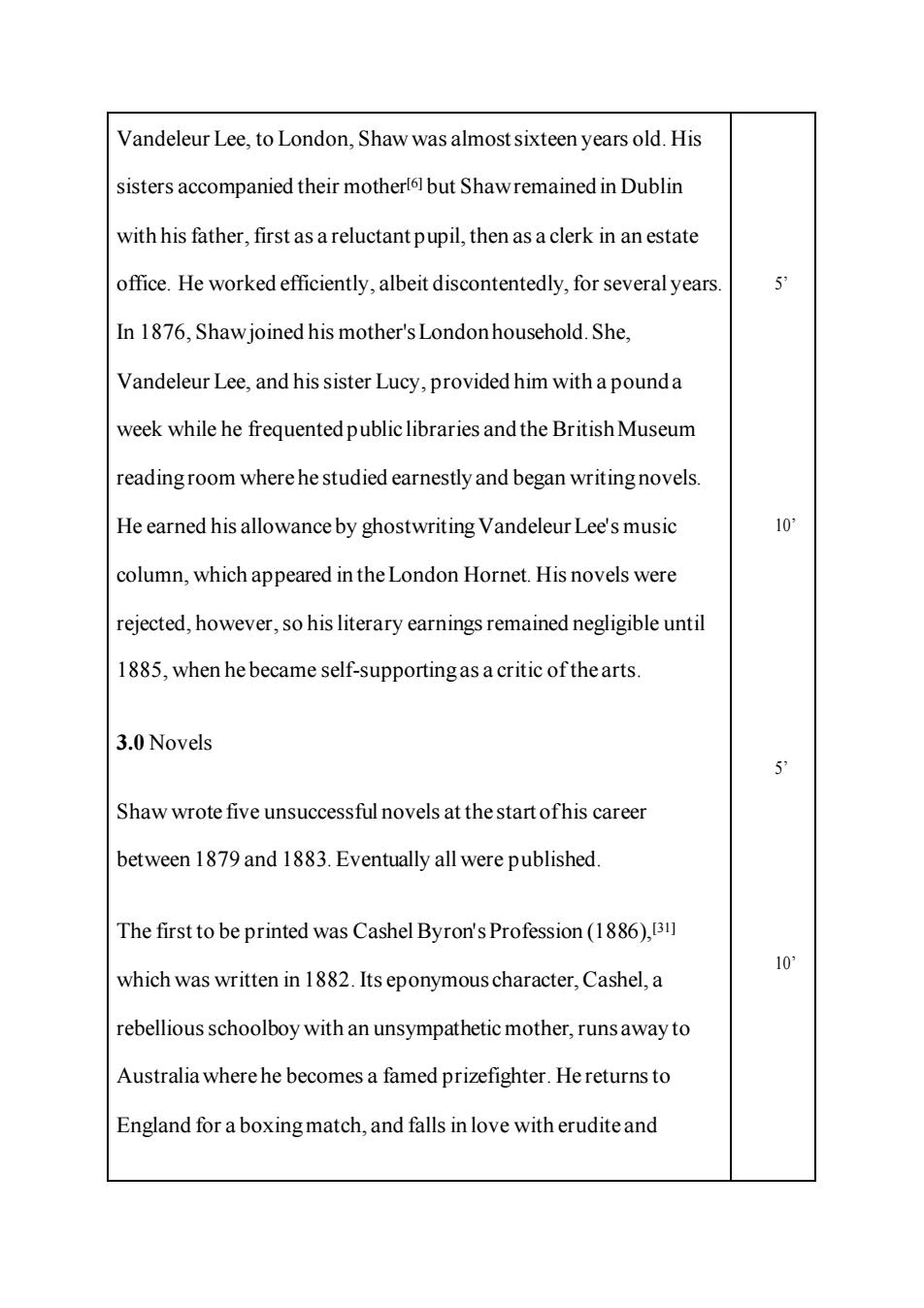
Vandeleur Lee,to London,Shaw was almost sixteen years old.His sisters accompanied their mothert1 but Shawremained in Dublin with his father,first as a reluctant pupil,then as a clerk in an estate office.He worked efficiently,albeit discontentedly,for severalyear 5° In 1876,Shaw joined his mother's London household.She, Vandeleur Lee,and his sister Lucy,provided him with a pounda week while he frequented public libraries and the British Museum reading room where he studied earnestly and began writing novels. He earned his allowance by ghostwriting Vandeleur Lee's music 10 column,which appeared in the London Hornet.His novels were rejected,however,so his literary earnings remained negligible until 1885,when he became self-supportingas a critic of the arts. 3.0 Novels 5 Shaw wrote five unsuccessful novels at the start ofhis career between 1879 and 1883.Eventually all were published The first to be printed was Cashel Byron's Profession(1886),1 10 which was written in 1882.Its eponymouscharacter,Cashel,a rebellious schoolboy with an unsympathetic mother,runs away to Australia where he becomes a famed prizefighter.He returns to England for a boxing match,and falls in love with erudite and
Vandeleur Lee, to London, Shaw was almost sixteen years old. His sisters accompanied their mother[6] but Shaw remained in Dublin with his father, first as a reluctant pupil, then as a clerk in an estate office. He worked efficiently, albeit discontentedly, for several years. In 1876, Shaw joined his mother's London household. She, Vandeleur Lee, and his sister Lucy, provided him with a pound a week while he frequented public libraries and the British Museum reading room where he studied earnestly and began writing novels. He earned his allowance by ghostwriting Vandeleur Lee's music column, which appeared in the London Hornet. His novels were rejected, however, so his literary earnings remained negligible until 1885, when he became self-supporting as a critic of the arts. 3.0 Novels Shaw wrote five unsuccessful novels at the start of his career between 1879 and 1883. Eventually all were published. The first to be printed was Cashel Byron's Profession (1886),[31] which was written in 1882. Its eponymous character, Cashel, a rebellious schoolboy with an unsympathetic mother, runs away to Australia where he becomes a famed prizefighter. He returns to England for a boxing match, and falls in love with erudite and 5’ 10’ 5’ 10’
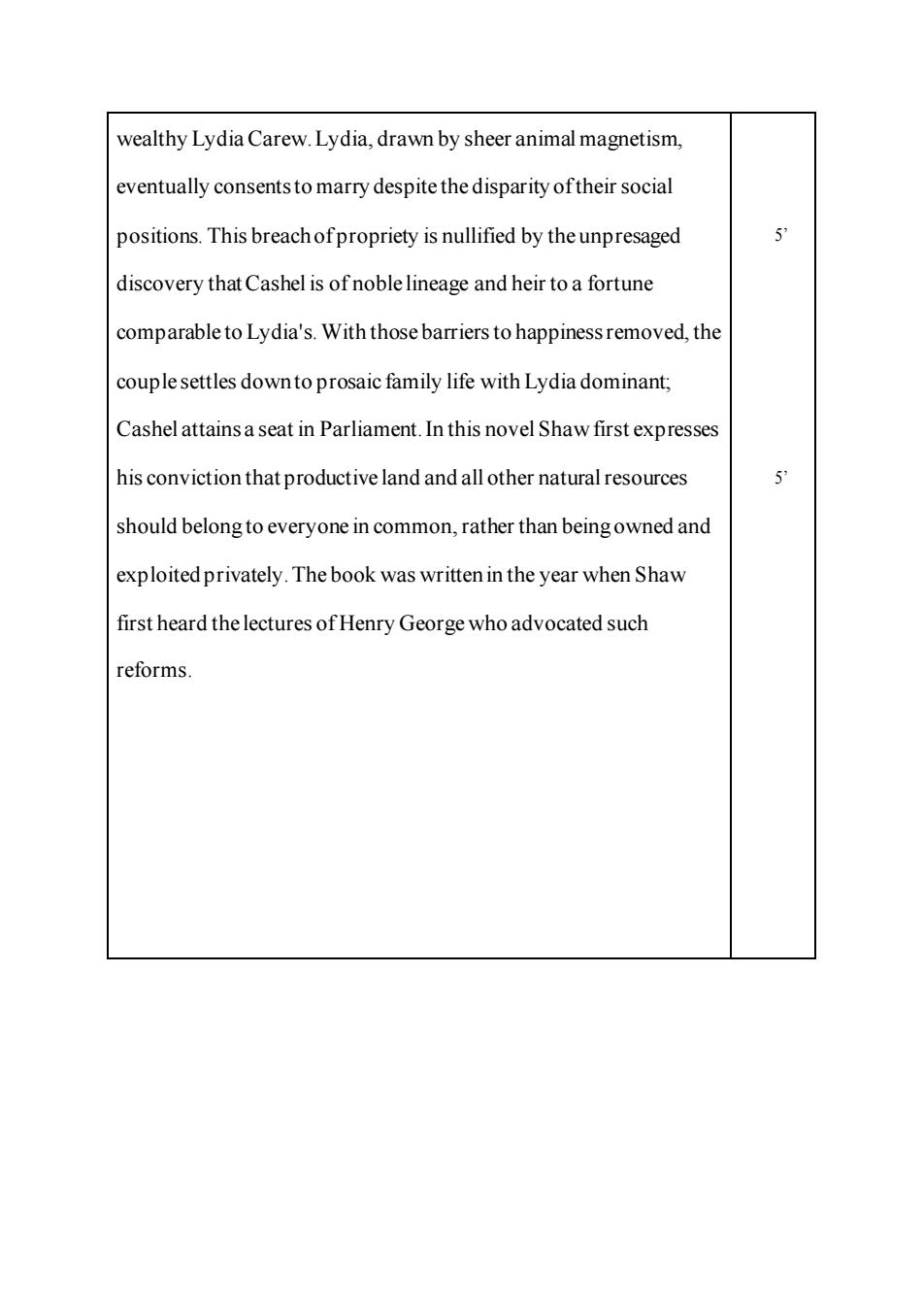
wealthy Lydia Carew.Lydia,drawn by sheer animal magnetism, eventually consentsto marry despite the disparity oftheir social positions This breachofpropriety isnulifed by theunpresaged 5 discovery that Cashel is ofnoble lineage and heir to a fortune comparable to Lydia's.With those barriers to happiness removed,the couple settles downto prosaic family life with Lydia dominant. Cashel attainsa seat in Parliament.In this novel Shaw first expresses his conviction that productive land and all other natural resources should belong to everyone in common,rather than being owned and exploited privately.The book was written in the year when Shaw first heard the lectures of Henry George who advocated such eforms
wealthy Lydia Carew. Lydia, drawn by sheer animal magnetism, eventually consents to marry despite the disparity of their social positions. This breach of propriety is nullified by the unpresaged discovery that Cashel is of noble lineage and heir to a fortune comparable to Lydia's. With those barriers to happiness removed, the couple settles down to prosaic family life with Lydia dominant; Cashel attains a seat in Parliament. In this novel Shaw first expresses his conviction that productive land and all other natural resources should belong to everyone in common, rather than being owned and exploited privately. The book was written in the year when Shaw first heard the lectures of Henry George who advocated such reforms. 5’ 5’